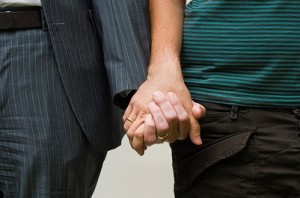
 In 2014 the first same-sex marriages will take place in the UK. There has been little protest since the new law passed and there is unlikely to be major opposition to the first ceremonies. Scot Peterson and Iain McLean examine the evolution of the debate and find that the shift in attitudes of both parliamentary and public opinion has been a rapid one.
In 2014 the first same-sex marriages will take place in the UK. There has been little protest since the new law passed and there is unlikely to be major opposition to the first ceremonies. Scot Peterson and Iain McLean examine the evolution of the debate and find that the shift in attitudes of both parliamentary and public opinion has been a rapid one.
Male homosexual conduct was only decriminalised in the UK in 1967 (sexual conduct between females had never been a crime). As recently as 1988, the UK parliament passed ‘section 28’ which outlawed ‘the teaching in any maintained school of the acceptability of homosexuality as a pretended family relationship’. It was purely expressive as no one was ever charged with its violation but was widely felt to encourage homophobia and to intimidate gay schoolchildren and their teachers. It was repealed in Scotland in 2000 and in England and Wales in 2003. Oddly, it had never been enacted in Northern Ireland, where it would have had more popular support.

Civil partnerships, available to same-sex couples only and containing all the rights and duties of marriage bar the name, were introduced by the UK parliament in 2005. Civil partnership ceremonies were analogous to civil marriage ceremonies in that they could not include religious language or music. Religious organisations could not allow them to be performed on their property, even if they solemnised religious marriages. They were not analogous to civil marriages, however, insofar as no religious alternative was available to same-sex couples: their relationships had to be recognised in a civil ceremony to be valid in law.
All this changed in Spring 2010 when the Labour peer Waheed Alli introduced a backbench motion to amend the Labour government’s equality bill, to permit civil partnerships to be performed on religious premises in England and Wales. Three religious groups—the Society of Friends (Quakers), Liberal Jews and Unitarians—had decided to press for the right to conduct not only civil partnerships but also same-sex religious marriages. Joined by some liberal Anglicans, they pointed out that not permitting them to conduct civil partnerships denied them religious freedom. Since religious freedom is guaranteed by the European Convention on Human Rights, this violated their legally enforceable rights. For this reason, and because it was politically popular, the Alli amendment passed easily in the House of Lords and was approved in the House of Commons without a vote. An attempt to repeal it in the House of Lords in 2011 failed.
Following an extensive consultation on how (not whether) same-sex civil marriage should be permitted in England and Wales, the government produced a bill in 2013. As with the Alli amendment three years earlier, the bill accommodated the demands of the religious groups that had determined that same-sex religious marriage was part of their beliefs. This accommodation likely resulted from legal advice that excluding them would result in a successful challenge in the UK courts or ultimately in the European Court of Human Rights. At the same time, while religious objectors to the bill were a small minority in the legislature, they were vocal and forced the government to incorporate elaborate protections to ensure that religious organisations could not be forced to conduct same-sex marriages. Among other things, both the religious organisation and the officiant must be willing to conduct such ceremonies before they can be legally authorised to do so, and neither the organisation nor the officiant can be legally compelled to conduct same-sex marriages.
The bill passed with comfortable majorities in both the House of Commons and the House of Lords. In the Commons it carried on the nearly unanimous vote of Liberal and Labour MPs, with the support of slightly under half of the Conservative MPs voting. In the House of Lords an effort to throw out the bill without debate was defeated overwhelmingly.
The Scottish government announced its plans to introduce same-sex civil marriage there at the same time as the government in Westminster. Its consultations have taken longer but in the first vote on the bill it passed by 98–12. The first same-sex marriages will be performed in England in 2014 and likely in Scotland in 2015.
This sudden change is not simply a British phenomenon, of course. The latest US data on “Do you support or oppose allowing same-sex couples to get married?” show 55% in support and 36% opposed. The polling expert Nate Silver suggests that a popular majority in all but six US states will support same-sex marriage by 2020.
Thus, in the forty-six years since male homosexual conduct was decriminalised, the preferences of the median member of the legislature have shifted dramatically. Members of the unelected House of Lords blocked repeal of section 28 twice in 2000, and ten years later they passed the Alli amendment by 95-21. Even in the early noughties majorities like these on same-sex marriage in the elected houses of the legislatures were unthinkable.
Reasons for change
This change in parliamentary opinion and popular opinion is the fastest that we know of. It is pointless to ask whether popular opinion drove the change in policy-makers’ positions: the two have proceeded in tandem. The most impressive, and reliable, evidence comes from the annual British Social Attitudes survey, which has been asking the same questions for twenty years. In 1987, 75% of their respondents thought that sex between two people of the same sex was mostly or always wrong, and only 13% thought that it was rarely wrong or not wrong at all. By 2012 these numbers had changed to 38% and 57%, respectively. The experts at British Social Attitudes believe that adverse attitudes in the 1980s hardened over the issue of AIDS, which occurred in disproportionate numbers in the gay male community and among intravenous drug users. Those attitudes have weakened as a result of two effects. One is generational turnover as younger people overwhelmingly support same-sex marriage, the second is an attitude change among older people, which can in turn be attributed to people knowing LGBT people among their friends or family. Nate Silver hypothesizes, as a rule of thumb, that these effects are approximately fifty-fifty in accounting for the changes.
Opposition to change
We see no plausible challenges to the implementation of the two acts in the UK. Religious conservatives continue to fret that the European Court of Human Rights will force vicars to marry same-sex couples; and the occasional couple has made noises about having a go. In fact, however, numerous lawyers have insisted that the chances of such an effort succeeding are extremely weak. And the Evangelical Alliance, which had opposed the bills, generally accepted the legal arguments its advocates had used once it passed.
Some might think that a backlash is likely, and anecdotal evidence can be interpreted to support that. The Supreme Court of India recriminalized homosexuality in December 2013, saying that only parliament (not the courts) had the power to decriminalise it. On similar procedural grounds, the federal high court in Australia invalidated a law legalising same-sex marriage in the Australian Capital Territory, holding that marriage was a matter for the federal rather than territorial or state legislature. Governments in countries as diverse as Russia, Uganda and Jamaica are vigorously opposing any relaxation of laws that discriminate against LGBT citizens. However, political scientists have found no support for the backlash hypothesis—at least based on evidence from the United States.
To us, the main news about same-sex marriage was the fact that the day after it was enacted it ceased to be news at all. In England and Wales, it disappeared from the headlines, although it may appear once again briefly (along with hackneyed stock photos of wedding cakes with two grooms) when the first ceremonies take place in 2014. In France, there were numerous hostile demonstrations when it first became legal in May last year but they have now vanished. Websites of groups that supported or opposed same-sex marriage have gone quiet. Opponents seem to lack the stamina to call for a reversal of the laws, and this is predictable, as once couples are married deeply entrenched interests reinforce the status quo. Reversing the law would involve serious disruption to the lives of these married same-sex couples. Instead, opponents concentrate on protecting the consciences of their co-religionists as is their right and duty.
Scot Peterson and Iain McLean are the co-authors of Legally Married: Love and Law in the UK and the US published by Edinburgh University Press.
Note: This article gives the views of the author, and not the position of the British Politics and Policy blog, nor of the London School of Economics. Please read our comments policy before posting.
About the Authors
 Scot Peterson is Bingham Research Fellow in Constitutional Studies at Balliol College and in the Division of Social Sciences, Oxford University. He has written extensively on church-state relations in the US and the UK and he is a contributor to Church and State in 21st Century Britain (2009).
Scot Peterson is Bingham Research Fellow in Constitutional Studies at Balliol College and in the Division of Social Sciences, Oxford University. He has written extensively on church-state relations in the US and the UK and he is a contributor to Church and State in 21st Century Britain (2009).
Iain McLean is Professor of Politics, Oxford University and a fellow of Nuffield College. He has published widely on UK and US politics and history and is collaborating author on the recent bestselling Scotland’s Choices: The Referendum and What Happens Afterwards (Edinburgh University Press, 2013).





